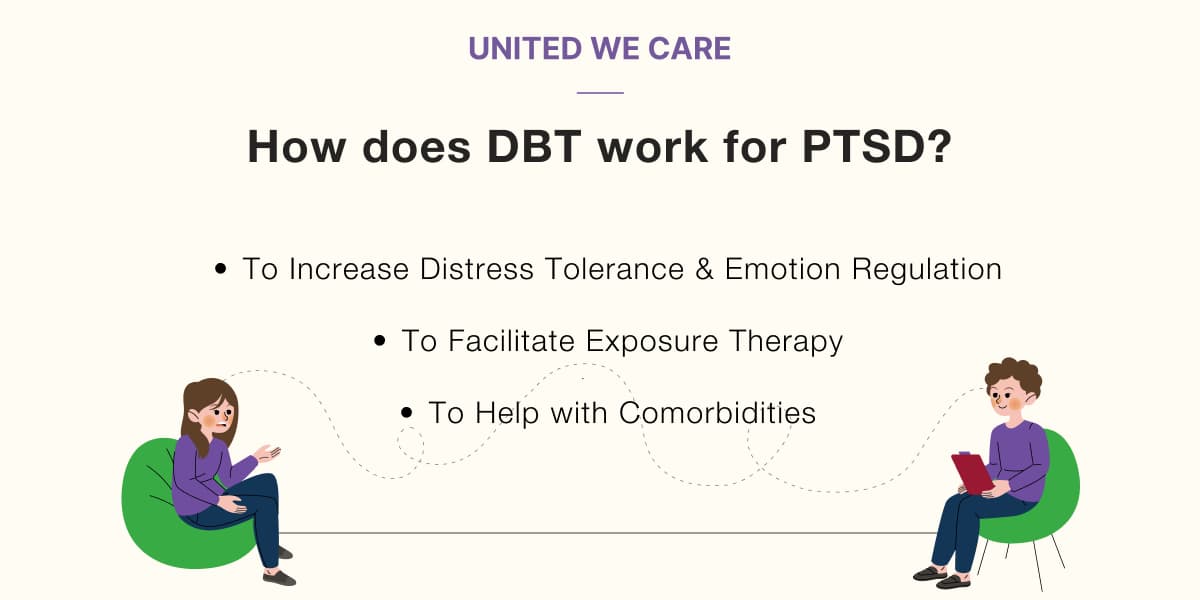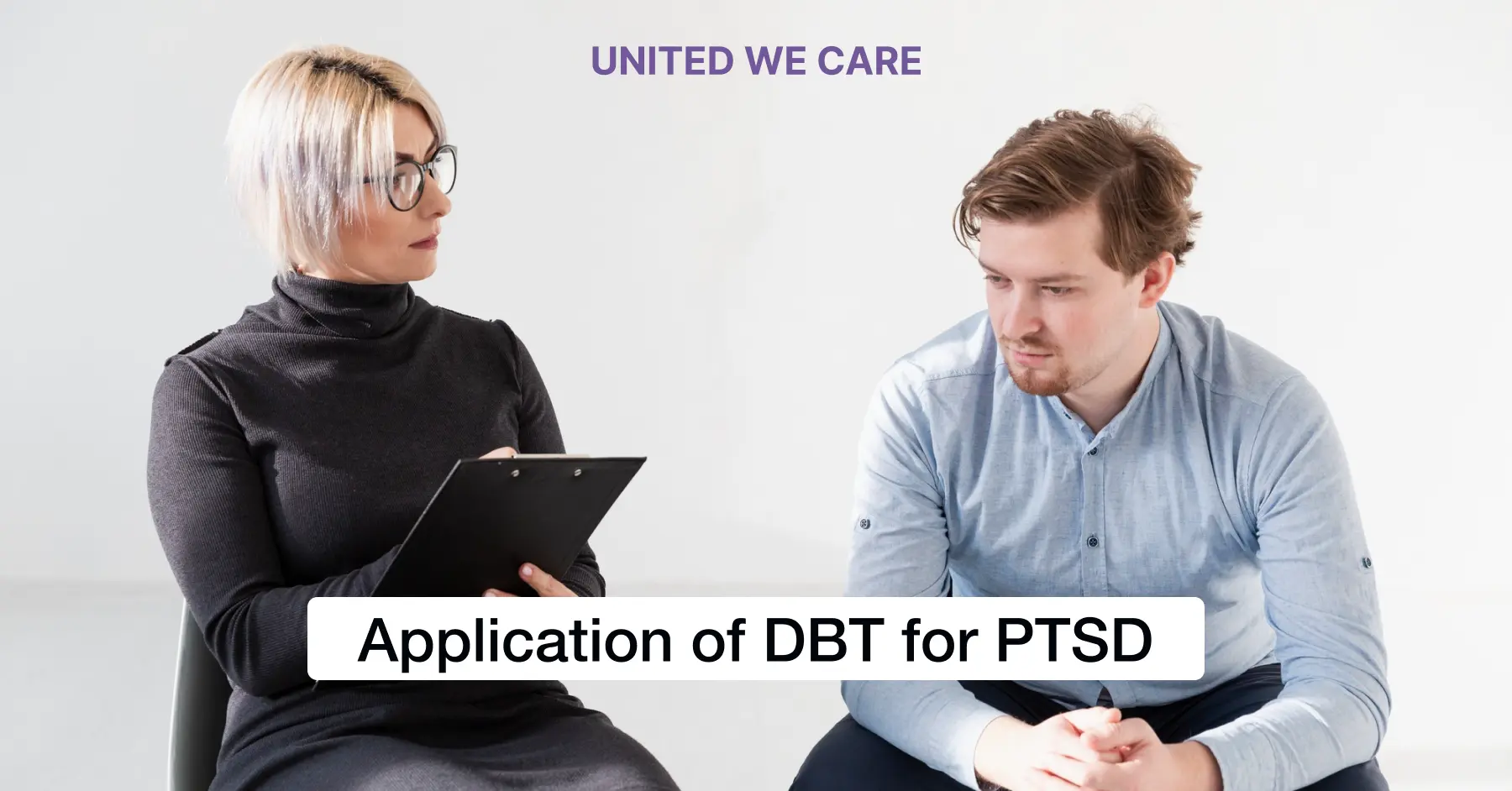Introduction
DBT, or Dialectical Behavioral Therapy, is a commonly used psychotherapy model for several mental illnesses, including PTSD. Post Traumatic Stress Disorder is a grave psychological disorder that occurs when a person experiences adversity.
Many of the symptoms that arise in PTSD can benefit from the use of DBT, such as flashbacks and hypervigilance. Let’s explore further how this unique treatment helps with such symptoms.
DBT for PTSD
Did you know that DBT can be very helpful in the treatment of PTSD? DBT is derived from the more popular treatment module, CBT or Cognitive Behavioral Therapy. However, DBT is specially designed for people who experience intense and rapidly shifting emotions.
A person with PTSD may largely benefit from DBT because of this feature. The intrusive memories, hypervigilance, and numbing symptoms associated with PTSD can have a reduced impact due to DBT sessions.
Moreover, in cases of complex PTSD associated with child abuse, sexual trauma, and long-term adversity, DBT is of ample utility. It not only causes a reduction of symptoms, but can also be used as a multi-modal tool in treatment.
Why is DBT Useful for PTSD?
Researchers have found that DBT can actually be very useful in the treatment of PTSD [1]. It may not help directly treat PTSD, but it serves as a very useful facilitating tool and catalyst. Therefore, in an eclectic approach, DBT can equip a professional with several resources to help their clients.
The principal features of DBT are learning how to accept what cannot be changed and identifying what can be changed. This is particularly useful when a person is dealing with trauma.
Clearly, one can learn to let go of the past using DBT and figure out what to do with the present. Furthermore, DBT instills various useful skills in the individual so that they can overcome their chronic problems.
How does DBT work for PTSD?
Let’s take a closer look at just how DBT works with PTSD. In this section, we will explain this in the following three ways.

To Increase Distress Tolerance & Emotion Regulation
Firstly, DBT is designed to increase a person’s window of tolerance. This is the range of tolerance an individual has for external and internal triggers. Beyond this range, humans have physiological reactions that heavily influence their behavior. A person with PTSD has a very limited window of tolerance.
Fortunately, in therapy, using treatments like DBT, they can slowly increase the range of their tolerance. DBT allows them to learn how to accept their discomfort and feel it instead of fixing it. Consequently, this assists them to regulate their emotions better.
To Facilitate Exposure Therapy
Next, apart from reducing specific signs and symptoms of PTSD, DBT can also be used in a multi-modal approach. Exposure therapy is a highly preferred treatment for PTSD.
It involves exposing the individual to their triggers in a progressive intensity to build their tolerance gradually. DBT can help facilitate this process and make it a lot smoother for both the client and the professional [2].
To Help with Comorbidities
Finally, people with PTSD often tend to have comorbidities like depression and anxiety. In case they have complex PTSD, they might also be dealing with a personality disorder and attachment issues.
When there are so many different sets of symptoms causing a person to suffer, DBT can buy time and increase resilience. It allows clients to feel capable of recovering and seeing practical changes in their life from healing.
What DBT Skill is Useful for Chronic PTSD?
In this section, we will describe specific DBT skills that are useful for chronic PTSD. Let’s look at the following four key skills of DBT.
Being Present in the Moment
Mindfulness is a crucial element of DBT. It is the practice of being fully present in the moment. People suffering from PTSD cannot help but live in the past. Their physiological reaction to the adversity forces them to relive past events.
Being mindful is the exact opposite of this, as it requires one to focus on the present. Often, this also involves grounding and relaxation. PTSD cannot exist in a relaxed body. So, the more a person practices mindfulness, the more they heal.
Communication Tools
Secondly, DBT focuses on improving a person’s interpersonal effectiveness. Essentially, this skill helps individuals to understand how to perceive themselves and others in more helpful ways so that they can communicate better.
Naturally, the communication skills established from this aspect of DBT aid PTSD survivors in relaying their needs. They are able to convey their requirements and boundaries better, thus mitigating triggers.
Dealing with Thoughts of Self-Harm
Primarily, DBT is centered on learning distress tolerance. This is another key aspect of this therapeutic approach. It allows the individual to sit with their discomfort without acting on it.
Patients with PTSD tend to have impulsive behavior and self-harming tendencies, especially if they have complex trauma. This useful skill of CBT can reduce the intensity and frequency of this PTSD symptom [3].
Reappraising the Situation
Lastly, like other models of behavioral therapy, DBT works towards changing a person’s attitude toward their circumstances [4]. This can be incredibly useful since individuals with PTSD commonly feel stuck and helpless.
DBT’s skills are split into acceptance-oriented skills and change-oriented skills. Obviously, both types help a person reappraise their situation and, thus, be less negative.
Conclusion
Dialectical Behavioral Therapy, or DBT, is a psychotherapy treatment model that focuses on developing certain skills in individuals to circumnavigate their illnesses. In this way, it can help individuals with psychological disorders such as Posttraumatic Stress Disorder.
PTSD can be a devastating and debilitating mental health condition that severely reduces a person’s quality of life. However, with the life-changing skills established with DBT, this negative impact can be thwarted. Learn more on how to use DBT for PTSD from United We Care!
References
[1] Steil, R., Dittmann, C., Müller-Engelmann, M., Dyer, A., Maasch, A. M., & Priebe, K. (2018). Dialectical behaviour therapy for posttraumatic stress disorder related to childhood sexual abuse: a pilot study in an outpatient treatment setting. European journal of psychotraumatology, 9(1), 1423832. https://doi.org/10.1080/20008198.2018.1423832
[2] C. B. Becker and C. Zayfert, “Integrating DBT-based techniques and concepts to facilitate exposure treatment for PTSD,” Cognitive and Behavioral Practice, vol. 8, no. 2, pp. 107–122, Mar. 2001, doi: 10.1016/s1077-7229(01)80017-1.
[3] Bohus, M., Schmahl, C., Fydrich, T. et al. A research programme to evaluate DBT-PTSD, a modular treatment approach for Complex PTSD after childhood abuse. bord personal disord emot dysregul 6, 7 (2019). https://doi.org/10.1186/s40479-019-0099-y
[4] Bohus M, Kleindienst N, Hahn C, et al. Dialectical Behavior Therapy for Posttraumatic Stress Disorder (DBT-PTSD) Compared With Cognitive Processing Therapy (CPT) in Complex Presentations of PTSD in Women Survivors of Childhood Abuse: A Randomized Clinical Trial. JAMA Psychiatry. 2020;77(12):1235–1245. doi:10.1001/jamapsychiatry.2020.2148










